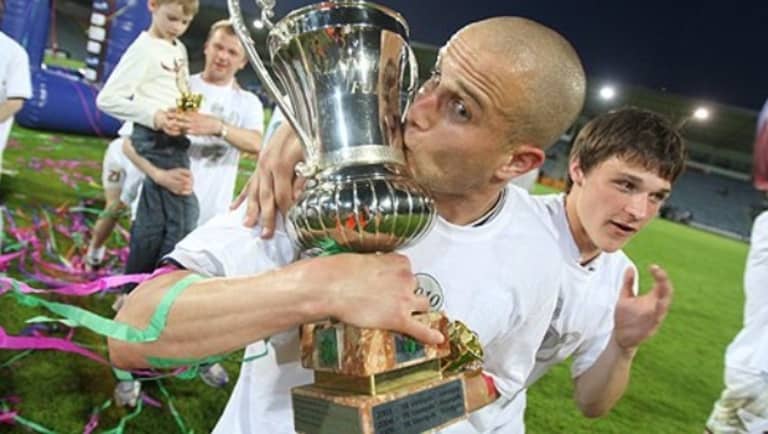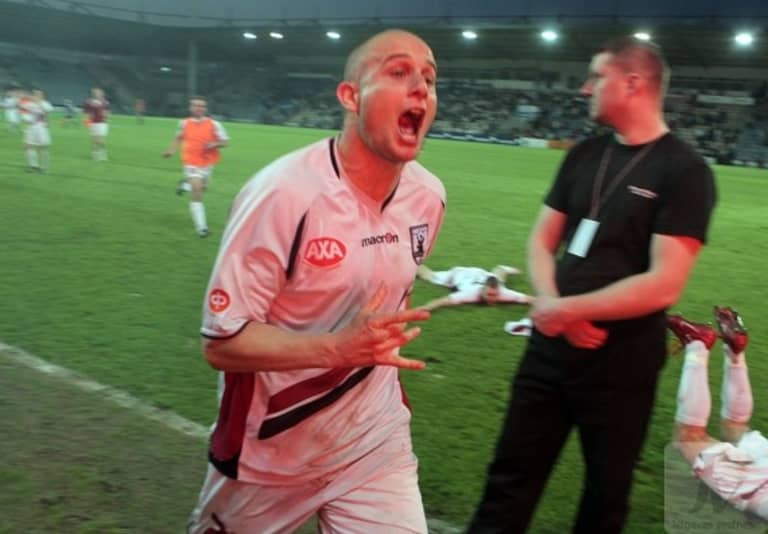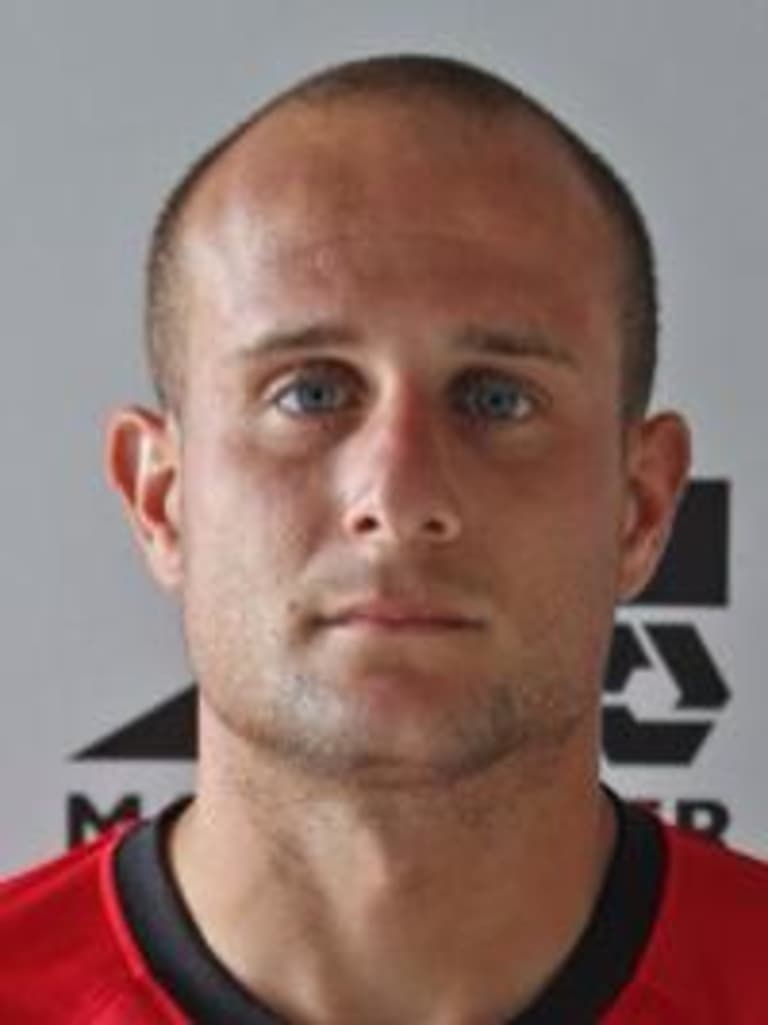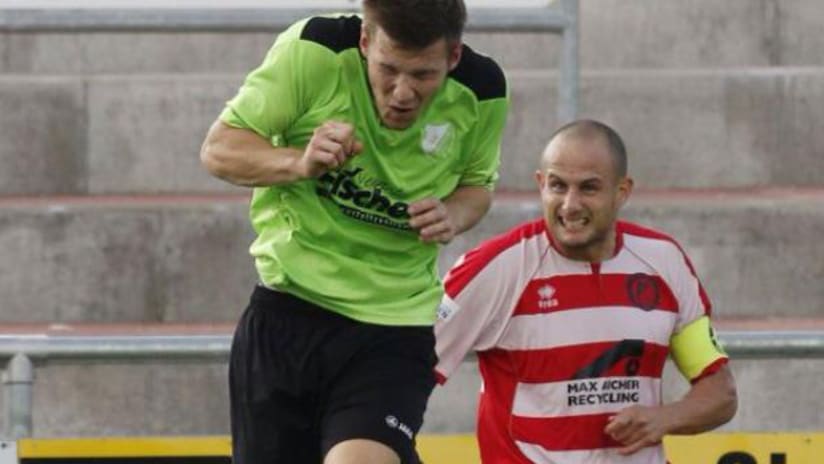AMSTERDAM – European soccer has been pretty good for New York native Nate Weiss, to say the least.
He has trained or played in six overseas countries, saw Europa League action and even stands as one of only 13 Americans to have ever won a primary domestic cup in Europe, so one would likely assume his most exciting childhood dreams had come true.
That is not actually the case, but his somewhat anonymous playing career in the Old World has put Weiss on the right path to achieving those fanciful ambitions of youth. The first step to achieving his biggest boyhood daydream was completed last month when he passed his UEFA "B" coaching license final with flying colors.
"When I was younger, if you can believe it or not, I always wanted to be a coach," Weiss, the newest man in charge at DFB-Stützpunkt, told MLSsoccer.com by phone from his holiday vacation spot in Florida. "My parents would buy me books about Dutch soccer drills, coaching books. I would sit in class, when I was in middle school, and write up tactics."
An American going through the coaching course in Europe is not entirely unusual, Steve Cherundolo being the latest to do it. But Weiss' big dream path did take a unique turn when he was quickly snapped up by Germany's national soccer federation, the Deutscher Fußball-Bund, as a youth scouting coach for boys aged 14-16.
The story of how Weiss got here is a bit of a low-boil thriller. He started his youth playing career at Florida's FC Weston, now a part of the U.S. Soccer Development Academy system. He went to college at North Carolina State, but left early to begin a pro jaunt that would start with Spanish third-division side UD Arenal.
He would eventually play in Ireland, Sweden, Latvia (where he helped raise FK Jelgava raise the domestic cup in 2010) and Germany. Weiss also had extended trials with the Chicago Fire and Israeli side Hapoel Ironi Kiryat Shmona along the way.

"I had this idea in my head that I wanted to go play in as many different countries as possible," he said. [Studying at NC State] wasn't really congruent to my goals. Yeah, it would have been great to have a degree, but I was ready to get out there and start learning in the real world."
Weiss, who does plan to finish his college education someday, says he never became lost without a diploma as he criss-crossed Europe's soccer map.
"I feel like I learned much, much more living on my own in Europe than I would have staying in college," offered Weiss, who now has a good command of German, Russian and Spanish. "It's not for everybody, but it was a huge step for me and I wouldn't change a thing."
The defensive handyman's playing career will end in Germany, but that is also the place where his coaching dream took off thanks to some inspiration from fellow Yank expatriate Joe Enochs. The former defensive midfielder not only tops the club's all-time games played chart with 418 appearances, he has worked every sideline from being interim manager for the senior squad to his current post as Under-19 boss.
"I contacted him, met with him, stayed at his house for a while," Weiss recalled. "He showed me how everything works in Germany."
After that, he wanted to shoot for the coaching license in Deutschland. "Outside of Holland, Germany probably has the best coaching system in the world," opined Weiss.
There was just one problem: he didn't speak German. He couldn't learn in his playing life, as it was far more important he take instruction quickly, and third-division salaries do not lend to pricey tutors.
"So I taught myself," said Weiss. "There were a lot of sleepless nights studying."
After about a year of learning the language to a workable level, he went off to Nürnberg to pass the initial coaching course. Weiss then spent another year going after the "B" license, which involved frequent trips to Munich between playing commitments to observe and report on the coaches running what he saw as similar to the Olympic Development Program back home in America.
He got excellent early feedback, but still lagged well behind all the native German speakers in the course in the area of paperwork.
"My speaking was perfect, but my writing was atrocious," recalled Weiss. "They called me in for a meeting, and I'm thinking they're going to tell me I can't go through."

Instead, DfB director Reinhard Klant and Germany U-17 coach Holger Seitz told Weiss that he would be allowed to take most of the written part of his final exam orally. It was, indeed, sweet medicine.
"Germans don't make exceptions," he said, still a bit floored by the honor. "That doesn't happen."
Weiss then had to sweat out the results in a room with everyone else, waiting for what seemed like an interminable span while they called out names in alphabetical order. Get less than five and you're weeded out, scoring five to nine gets a pass and an automatic course review, 10 or better earns the shiny new "B" license.
"People are very stressed out," said Weiss. "Clubs are paying for them to be here, they are taking off work, they have studied for a year."
This long wait comes after the years' work and two days in front of an esteemed testing committee firing questions with a topic range including tactics, physical maintenance and situation solutions.
"I'm freaking out, saying if I can get five points, I'll be happy," he laughed. "I'll go to Ireland and take it again in English or something. I'd spent two-and-a-half years doing this and there was no way they weren't going to pass me."
He was right. The next time Klant and Seitz called him to the office, it was to relay that he had scored an 11. "I started tearing up a little bit," said Weiss. "Maybe two out of 20 before me got through and they were all Germans. I had no idea it was going to happen."
The great news came with an additional piece of advice: stop playing as a career. It's not the first thing most 27-year-old players will want to hear, but the DfB officials explained to Weiss that, unlike his trajectory on the field, there was no limit to how much he could do in the coaching game.
"I brought a lot of American characteristics to it, motivating and being outspoken," he said. "They seemed to like it. For Germans to say this is not very normal. So they pushed me along to the next course."
If all continues along the same trail, Weiss will be eligible to coach a youth Bundesliga team about a year from now. Everything was going according to the dream, but the DfB was far from done with its surprises.
"I get a call a few weeks later," said Weiss. "They had a really good recommendation and would I be interested in being a coach. I said, ummmmm, yeah! Obviously!"
This past summer, Weiss followed the earlier advice and left his club to become player/coach with sixth flight SV Seligenporten II in order to focus on coaching. Mere months later, he is already a cog in the Die Mannschaft machine.
"We recognize youth talent to go the next step to get onto the national team," he said of his new job.
Having grown up in the American youth system, Weiss has the enviable position of being able to seeing the game from numerous cultural viewpoints. In Germany, Weiss believes they take their schooling of the sport much further into "soccer nerd" dimensions than the programs back home.

"They approach the game a different way," he said. "We're optimists, we're always motivating and looking to win and thinking things are possible.
"The German coaching style is very scientific and analytical. There's much more practical stuff I have to do, reporting on what drills work in training or what works in a game. They also focus a lot on biological stuff that goes on in the body. They cover settling player disputes, dealing with players in puberty, integrating those from different countries."
Differences aside, Weiss is not advocating that U.S. Soccer needs to copy the current world champs or any other great team. He says the key to reaching the heights of those nations is developing a distinctly American way to play.
"The Dutch are good because they are always adapting," he explained. "That will be the key for the US one day: adapting. That's got to start from when they're 7, 8 years old.
"We can't say we're going to play like someone else. We're not them, we grow up differently, have a different mentality. When we try to become other nations and not ourselves, I think that's not a recipe for success."
There are still a few things we could learn, he says. For instance, some youth players capable of developing can get ignored by coaches that become overly fascinated with athletic prowess. Weiss feels this kills the late-bloomer effect to some extent.
"Look at Thomas Müller," he noted. "If he grew up in the States, I guarantee you he wouldn't get a college scholarship. He's got chicken legs, he's not fast, and now he's the leading scorer for the German national team.
"They look at different things. Just because some people have speed and strength, it doesn't mean we should only focus on this natural talent."
Weiss also would do away with setting young players in a position until they are about 17. "There's 8-year-olds saying, I'm a right midfielder," he griped. "They get that from the coaches. We're not grooming footballers, complete soccer players that then fit into a position later."
That's not to say he isn't a U.S. Soccer diehard or that he doesn't see progress under current USMNT head coach Jurgen Klinsmann.
"There were definitely signs we are an evolving nation [during the recent World Cup 2014 cycle]," he rated. "We now have actual ball-playing center backs, guys that want to play the ball out of the back. I just think people saw when we played against Belgium that there is a very, very long way to go."
Which brings us right to where Weiss has wanted this coaching dream to take him: right back to America. Going back to childhood, that's the way it has always been drawn up in his tactics.
"That's the reason why I did all this," he declared. "I want to be of value to the U.S. Soccer Federation. I want to come over here eventually when I have some experience.
"You can have an impact in US soccer in MLS or with U.S. Soccer. Either would be good, both would be great. I'm just looking to use what I know to be of some service to my country."










